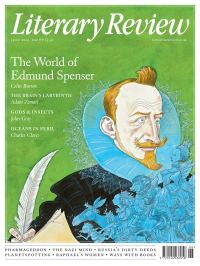John Gray
Life’s Greatest Achievement?
The Social Conquest of Earth
By Edward O Wilson
W W Norton 330pp £18.99
‘The dilemma of good and evil was created by multilevel selection, in which individual selection and group selection act together on the same individual but largely in opposition to each other.’ Combining an aura of scientific rigour with magisterial obscurity, this dictum conveys the flavour of much of what Edward O Wilson’s publisher describes as ‘the clearest explanation ever produced as to the origin of the human condition’. Wilson’s thesis is easily articulated, and not unfamiliar: morality is a product of evolution, emerging as a result of the interaction of two kinds of natural selection. Individual selection ‘shapes instincts in each member that are fundamentally selfish’, while group selection ‘shapes instincts that tend to make individuals altruistic toward one another’. The moral conflicts with which philosophers and dramatists have struggled for millennia can at last be resolved by science. ‘Individual selection is responsible for much of what we call sin, while group selection is responsible for the greater part of virtue. Together they have created the conflict between the poorer and the better angels of our nature.’
Stupendous in its ambition, Wilson’s formulation does come with some problems. As anyone who has read Aristotle’s Ethics will know, morality has not always been equated with altruism. The good life for Aristotle was one in which individuals – leisured, property-owning male individuals, at any rate – realised their distinctively

Sign Up to our newsletter
Receive free articles, highlights from the archive, news, details of prizes, and much more.@Lit_Review
Follow Literary Review on Twitter
Twitter Feed
Under its longest-serving editor, Graydon Carter, Vanity Fair was that rare thing – a New York society magazine that published serious journalism.
@PeterPeteryork looks at what Carter got right.
Peter York - Deluxe Editions
Peter York: Deluxe Editions - When the Going Was Good: An Editor’s Adventures During the Last Golden Age of Magazines by Graydon Carter
literaryreview.co.uk
Henry James returned to America in 1904 with three objectives: to see his brother William, to deliver a series of lectures on Balzac, and to gather material for a pair of books about modern America.
Peter Rose follows James out west.
Peter Rose - The Restless Analyst
Peter Rose: The Restless Analyst - Henry James Comes Home: Rediscovering America in the Gilded Age by Peter Brooks...
literaryreview.co.uk
Vladimir Putin served his apprenticeship in the KGB toward the end of the Cold War, a period during which Western societies were infiltrated by so-called 'illegals'.
Piers Brendon examines how the culture of Soviet spycraft shaped his thinking.
Piers Brendon - Tinker, Tailor, Sleeper, Troll
Piers Brendon: Tinker, Tailor, Sleeper, Troll - The Illegals: Russia’s Most Audacious Spies and the Plot to Infiltrate the West by Shaun Walker
literaryreview.co.uk